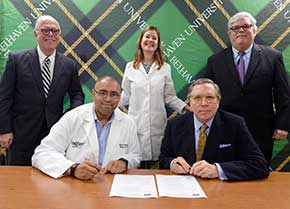EasyKale Labs LLC and Belhaven Partner for Cancer Research
 September 12, 2019 (Jackson, Miss.) - EasyKale® Labs and Belhaven University have entered into a Memorandum of Understanding (MOU) to collaborate on cancer research. Specifically, they will work to study “the effect of kale on various lines of cancer in vitro and activities related thereto.” The agreement has been signed by Belhaven University President, Dr. Robert Parrott, and EasyKale® CEO Bilal Qizilbash.
September 12, 2019 (Jackson, Miss.) - EasyKale® Labs and Belhaven University have entered into a Memorandum of Understanding (MOU) to collaborate on cancer research. Specifically, they will work to study “the effect of kale on various lines of cancer in vitro and activities related thereto.” The agreement has been signed by Belhaven University President, Dr. Robert Parrott, and EasyKale® CEO Bilal Qizilbash.
This continues the work that Qizilbash began with Dr. Elizabeth Brandon, who is now a Professor of Biology at Belhaven University. Together, they discovered that juiced kale kills certain types of liver cancer cells in vitro while not affecting non-cancerous cells. This is in addition to their previous (now patented) discovery that juiced kale kills melanoma cells in vitro (U.S. Patent 9,919,016).
The team's melanoma cancer cell breakthrough came in 2013 when Qizilbash was a graduate student at Mississippi College working with Dr. Brandon on his master's degree in medical sciences. That research was first presented at the Global Health and Innovation Conference at Yale University in 2014. Their continued research led to the liver cancer cell breakthrough.
“We are forming this long-term research relationship with Belhaven to help fight and make headway into chronic diseases to improve our world.Right now we are focusing on cancer but in time we are hoping to expand our research. The students are our future and they are brimming with new, bright, and brilliant ideas that can help advance humanity forward. It is an honor to partner with such a forward-thinking University,” Qizilbash said. "May we work together to help ease global suffering and make cancer a thing of the past."
The discoveries to-date were initially inspired by Qizilbash's suspicion that healthy juices containing kale prepared by his mom earlier in his career had actually reduced the size of his own skin tags. Once he was able to test and gain traction for his theory during his master's degree studies, he set out on a mission to help get more kale into peoples' diets.
The parties will collaborate on publishing academic papers and presentations of research results. Students will benefit from the preparation of papers and research posters and promote Belhaven University's role in this student research. Dr. Brandon adds, “The big picture is to help humanity advance forward with collaborative discoveries, which can advance innovation with a laser beam focus on better health and quality of life.”
Dr. Brandon observed, “This collaboration helps Belhaven University students learn to perform novel research that improves their critical thinking. The students' results can be used to determine how whole vegetables and fruits may have therapeutic effects beyond that of their dietary importance. This is a whole approach for studying cancer and it is currently being conducted by our undergraduate students.”
